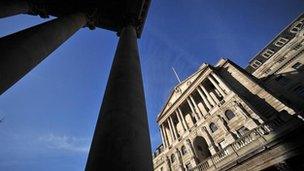Bank of England suspects traders of bond-rigging
- Published

The FCA - and the Bank of England's lawyers - are looking into unusual bond prices in the market
The Bank of England has asked the Financial Conduct Authority (FCA) to examine whether traders tried to rig the price of one of its bond buybacks.
The news emerged when Paul Fisher, executive director for markets, gave evidence to MPs about its quantitative easing (QE) stimulus programme.
Mr Fisher said suspicious movements in the price of the 2017 bond auction had been observed.
This is the latest report of possible unethical behaviour from traders.
He said such price-rigging would be "reprehensible" behaviour, although he said: "We don't know if there was an attempt to rig a gilt auction."
The Bank has been buying in £375bn worth of bonds - mainly government bonds, known as gilts - in a bid to release money to banks and the wider economy.
Test
During one auction in 2011, the price of one gilt issue, dated 2017, resulted in the Bank refusing to buy back these bonds, because of what it said was an unusual rise in the price.
The Bank was known to be keen to buy in government bonds and an attempt to boost the price out of line with other similar products on the market would mark an attempt to test the Bank's willingness to pay high prices.
Mr Fisher told MPs: "It was very obvious to us what was happening, because one gilt was moving in the opposite direction to other gilts in the market, so there was a clear signal.
"We've never seen anything like that previously and we've never seen anything like that again," he said.
He also asked the Bank's lawyers to look into the matter.
Mr Fisher said: "All the evidence we've got we've passed across."
The FCA would not comment.
There are 21 banks that act as frontline dealers in the government bond market, including some of the world's biggest financial institutions.
Recently, Barclays, Royal Bank of Scotland and UBS were fined by regulators for rigging Libor, the key lending rate that affects mortgages and other loans.